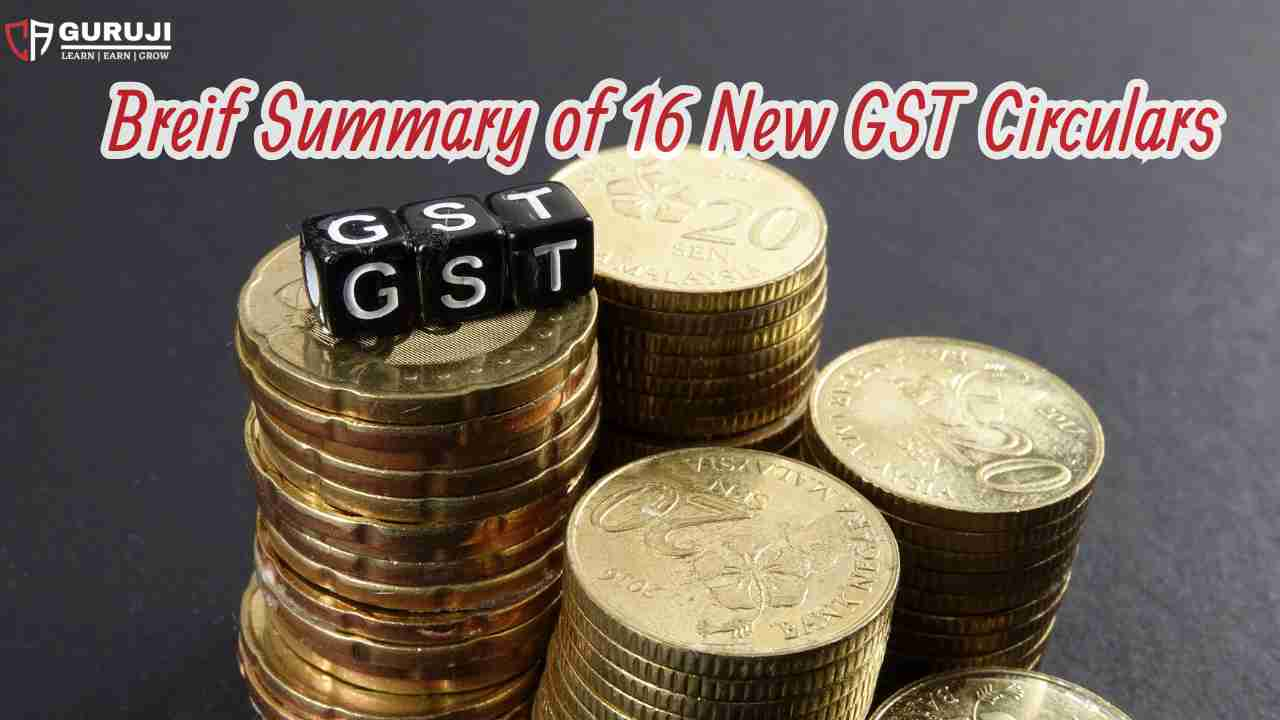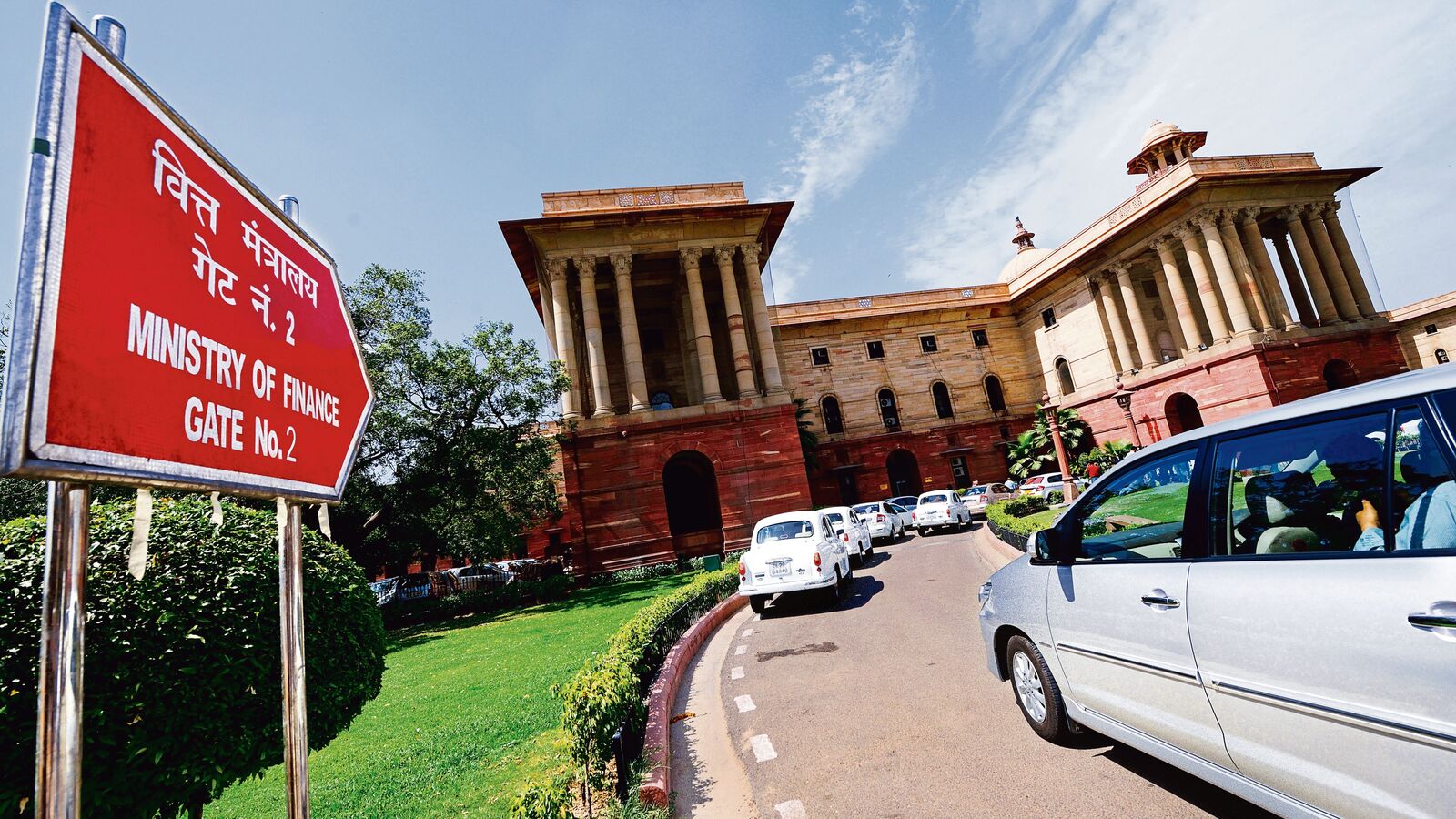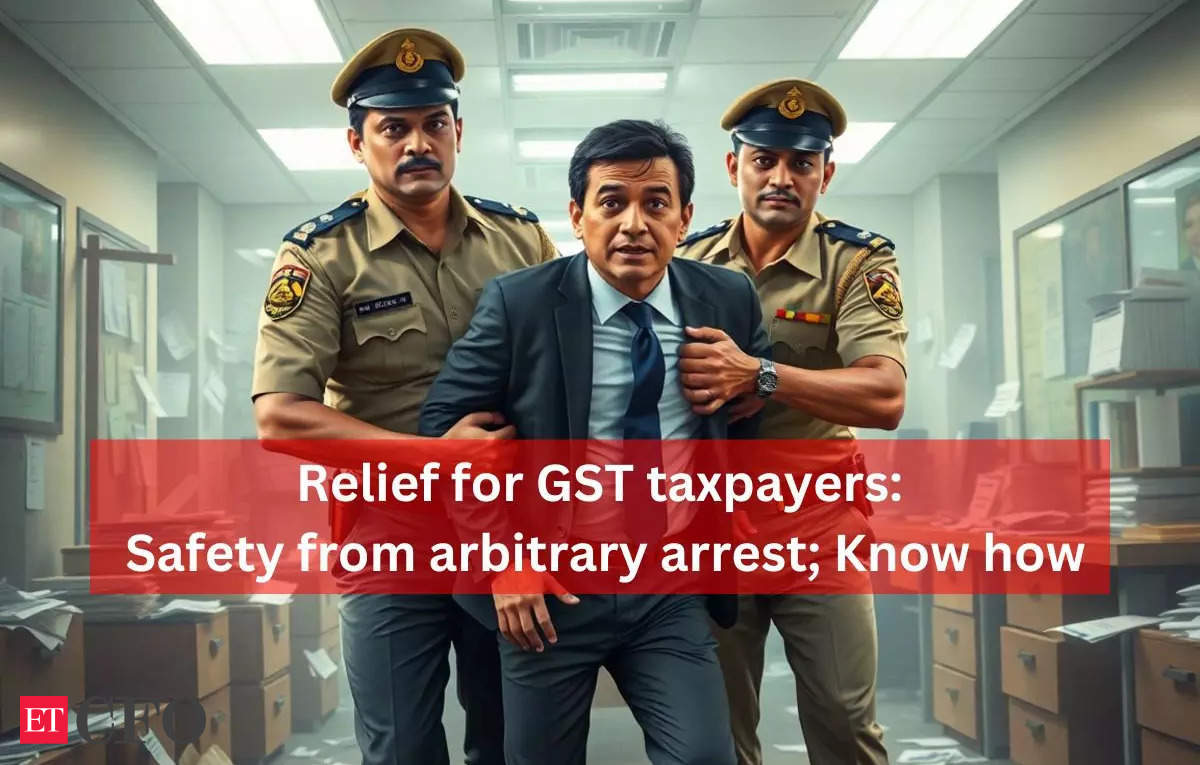On June 26, 2024, the Central Board of Indirect Taxes and Customs (CBIC) issued 16 new circulars under the Central Goods and Services Tax Act, 2017 (CGST Act). These circulars aim to bring clarity, ease of doing business, and reduce unwarranted litigation, in line with the recommendations made during the 53rd GST Council meeting. Below, we provide a brief summary of the key points addressed in these circulars.
Overview of the Circulars
| Circular No. | Date | Subject |
|---|---|---|
| 207/1/2024 | 26 June 2024 | Reduction of government litigation, fixing monetary limits for filing appeals |
| 208/2/2024 | 26 June 2024 | Clarifications on various issues pertaining to special procedure for the manufacturers of specified commodities |
| 209/3/2024 | 26 June 2024 | Clarification on the provisions of clause (ca) of Section 10(1) of the IGST Act, 2017 relating to place of supply |
| 210/4/2024 | 26 June 2024 | Clarification on valuation of supply of import of services by a related person where recipient is eligible for ITC |
| 211/5/2024 | 26 June 2024 | Clarification on time limit under Section 16(4) of CGST Act, 2017 for RCM supplies received from unregistered persons |
| 212/6/2024 | 26 June 2024 | Clarification on mechanism for providing evidence of compliance with conditions of Section 15(3)(b)(ii) of CGST Act |
| 213/7/2024 | 26 June 2024 | Clarification on taxability of reimbursement of securities/shares as SOP/ESPP/RSU provided by a company to its employees |
| 214/8/2024 | 26 June 2024 | Clarification on the requirement of reversal of input tax credit in respect of the portion of the premium for life insurance policies not included in taxable value |
| 215/9/2024 | 26 June 2024 | Clarification on taxability of wreck and salvage values in motor insurance claims |
| 216/10/2024 | 26 June 2024 | Clarification on GST liability and input tax credit availability in cases involving Warranty/Extended Warranty |
| 217/11/2024 | 26 June 2024 | Entitlement of ITC by insurance companies on expenses incurred for repair of motor vehicles in case of reimbursement mode of insurance claim settlement |
| 218/12/2024 | 26 June 2024 | Clarification regarding taxability of the transaction of providing loan by an overseas affiliate to its Indian affiliate or by a person to a related person |
| 219/13/2024 | 26 June 2024 | Clarification on availability of input tax credit on ducts and manholes used in network of optical fiber cables (OFCs) |
| 220/14/2024 | 26 June 2024 | Clarification on place of supply applicable for custodial services provided by banks to Foreign Portfolio Investors |
| 221/15/2024 | 26 June 2024 | Time of supply on annuity payments under HAM Projects |
| 222/16/2024 | 26 June 2024 | Time of supply in respect of supply of allotment of Spectrum to Telecom companies in cases where an option is given for payment in installments or upfront |
Detailed Clarifications
1. Reduction of Government Litigation
Subject: Reduction of Government Litigation
The circular has notified certain principles, exclusions, and monetary limits for filing of appeals under GST by the department before GSTAT, High Court, and Supreme Court. The following monetary limits have been specified:
- GSTAT: INR 2 million
- High Court: INR 10 million
- Supreme Court: INR 20 million
It has also been clarified that non-filing of appeal based on the above monetary limits will not preclude the tax officer (TO) from filing an appeal or application in any other case involving the same or similar issues in which the tax in dispute exceeds the monetary limit or in a case involving questions of law.
The Department’s decision not to appeal based on monetary limits does not imply acceptance of the underlying issues. Each cited prior order must be verified for acceptance due to monetary limits before being considered as a precedent.
Details: Fixes monetary limits for filing appeals or applications by the Department before GSTAT, High Courts, and Supreme Court to reduce administrative burden and prevent insignificant cases from escalating.
2. Special Procedure for Manufacturers
Subject: Clarifications on Various Issues Pertaining to Special Procedure for the Manufacturers of Specified Commodities
The circular provides clarifications on various practical issues related to complying with the special procedures for registered persons engaged in manufacturing specific goods such as pan masala, tobacco, and others. These clarifications focus on reporting aspects, such as:
- Non-availability of make, model number, and machine number
- Absence of electricity consumption rating of the packing machine
It outlines the manner of undertaking compliances in such cases.
Key points clarified include:
- The special procedure is not applicable to:
- Special economic zone units
- Manual processes using electric-operated heat sealers and seamers
- The procedures are applicable for job-work and contract manufacturing scenarios.
Details: Addresses specific procedures and requirements for manufacturers to ensure compliance and smooth functioning under GST.
3. Place of Supply
Subject: Clarification on Provisions of Clause (ca) of Section 10(1) of IGST Act, 2017 Relating to Place of Supply
The circular clarifies the following regarding the place of supply of goods when dealing with unregistered persons:
- If the delivery address of goods recorded on the invoice differs from the billing address of the unregistered person, the place of supply will be the delivery address.
- For instance, if an unregistered person from State ‘X’ orders goods but directs delivery to a different address in State ‘Y’, the place of supply will be State ‘Y’ (the delivery address).
- Suppliers should record the delivery address as the recipient’s address on the invoice to determine the place of supply of the goods.
Details: Clarifies the place of supply for certain transactions to avoid disputes and ensure uniform application of the law.
4. Valuation of Import of Services
Subject: Clarification on Valuation of Supply of Import of Services by a Related Person
The circular clarifies the following regarding the import of services between related persons:
- The earlier circular dated 17 July 2023 concerning supplies of services between distinct persons where full Input Tax Credit (ITC) is available to the recipient is equally applicable to the import of services between related persons.
- The value of the supply of services declared in the invoice will be deemed the open market value if the recipient is eligible for full ITC as per the second proviso to rule 28 (1) of the CGST Rules.
- For such imported services, the recipient in India must pay tax under the reverse charge mechanism and issue a self-invoice as required by law.
Details:
This is a welcome move and will provide significant relief to taxpayers by resolving pending litigations on the taxability of import services by Indian entities from foreign-related parties.
Additionally, it will also benefit taxpayers who may have missed issuing invoices on service imports from foreign-related parties.
Going forward, companies may review their positions on the taxability and valuation of import services from foreign affiliates considering these clarifications.
Notably, this circular suggests that the previous circular also applies to related parties and can apply to domestic-related parties as well.
However, the interplay with other laws like customs and income tax may need examination while applying the circular.
5. Reverse Charge Mechanism (RCM)
Subject: Clarification on Time Limit Under Section 16(4) of CGST Act, 2017 for RCM Supplies Received from Unregistered Persons
The circular clarifies that Section 16(4) of the CGST Act, which links the time limit for ITC (Input Tax Credit) availability with the financial year (FY) to which the invoice or debit note pertains, applies differently in specific cases.
For supplies where the tax is paid by a recipient under the Reverse Charge Mechanism (RCM) from unregistered suppliers, and the invoice is issued by the recipient as per Section 31(3)(f) of the CGST Act, the relevant FY for calculating the time limit for availing ITC will be the FY in which the self-invoice has been issued by the recipient. This is in line with Section 16(4) of the CGST Act, subject to other conditions and restrictions under Sections 16 and 17 of the CGST Act.
Additionally, if the recipient issues an invoice after the time of supply and pays the tax, they will be required to pay interest and may also be liable to pay a penalty according to Section 122 of the CGST Act.
Details:
This clarification comes as a big relief as it will resolve disputes regarding ITC availability in cases where the taxpayer has paid tax under RCM in years subsequent to the year of the actual transaction.
Notably, this clarification is contrary to the decision of the Authority for Advance Rulings in the case of Vishnu Chemicals Limited, which stated that the period to which an invoice pertains for the purposes of section 16(4) of the CGST Act will mean the period of supply covering which the invoice was issued. The position clarified in the circular is surely more taxpayer-friendly and hence, will be welcomed by the industry.
Since the circular provides clarification only for RCM supplies received from unregistered suppliers, the benefit may not extend to other RCM supplies received from registered suppliers (for example, registered Goods Transport Agency, etc.).
Importantly, the circular mentions that the recipient is required to pay interest and possible penal exposure in the case of delayed payment of tax and non-issuance of self-invoice in time. The defendability of interest levy and penalty, particularly in scenarios involving bona fide interpretational issues and considering the amnesty scheme announced for notices under section 73 of the CGST Act, needs further examination.
Considering the background provided in the circular, these clarifications should apply in all cases, i.e., where tax is paid by the taxpayer suo-moto, on the basis of some clarification issued by the department, on the basis of some court judgement, or on being pointed out by tax authorities during scrutiny, audit, or otherwise.
6. Compliance with Post-Sales Discount
Subject: Clarification on Mechanism for Providing Evidence of Compliance with Conditions of Section 15(3)(b)(ii) of CGST Act
The circular states that until a functionality or facility is made available on the common portal to verify compliance with section 15(3)(b)(ii) of the CGST Act, the supplier may procure a certificate issued by a Chartered Accountant (CA) or Cost Accountant (CMA) [containing a Unique Document Identification Number (UDIN)] from the recipient of the supply. This should certify that the recipient has proportionately reversed ITC at their end for the credit note issued by the supplier. The suppliers can obtain a self-undertaking from the recipients if the reversal amount is less than INR 0.5 million in a financial year.
The circular specifies that the certificate or undertaking may contain the details of the credit note, the invoice against which the credit note has been issued, the ITC reversal amount, and a relevant document (Form GST DRC-03, return, etc.) that provides evidence of the reversal of ITC.
The circular further states that the certificates or undertakings will be treated as suitable and admissible evidence for the purpose of section 15(3)(b)(ii) of the CGST Act and produced by the supplier before the tax officers, if required, during any proceedings (scrutiny, audit, investigations, etc.).
The circular also clarifies that the same mechanism can be applied for the past period, wherever any such evidence is required to be produced by the supplier to the tax authorities.
Details:
The circular clarifies the tax liability for credit notes raised on account of any discount policy. This is a welcome clarification for the benefit of trade and industry as it provides the necessary mechanism for evidencing the credit reversal through third-party certification or, in certain cases, self-certification by the recipient.
However, the circular is not clear on a few aspects, such as whether the recipient can obtain a single certificate for all suppliers or if the certificate needs to be issued for each supplier individually. Additionally, while the circular states that the same mechanism can be applied for the past period, it lacks clarity regarding the period which can be covered in a single certificate.
It is to be appreciated that the requirement of obtaining a certificate or undertaking is only until the functionality is made available on the common portal. Also, the interim mechanism proposed by the circular will increase the cost of compliance for businesses. Therefore, it is imperative that the functionality to verify compliance on the portal is implemented soon. Alternatively, some mechanism for departmental verification of the compliances may be introduced in the interim.
Notably, the circular restricts these additional compliances to adjustments in taxable value in a discount scenario and does not cover other GST credit note scenarios such as sales returns.
7. Taxability of Employee Benefits
Subject: Taxability of Reimbursement of Securities/Shares as SOP/ESPP/RSU
The circular clarifies that GST is not leviable on the allotment of securities or shares by the foreign holding company to the employees of the domestic subsidiary company on the following grounds:
- The transaction is neither a supply of goods nor a supply of services as it is undertaken as part of the compensation package for the enhanced performance of employees and their retention; this is covered under Entry 1 of Schedule III of the CGST Act.
- Shares are securities, which are excluded from the definition of goods as well as services.
It also clarifies that GST is not leviable on the reimbursement made on a cost-to-cost basis by the domestic subsidiary company to the foreign holding company for such transfer of securities or shares.
However, the circular states that if the foreign holding company charges any additional fee, markup, or commission from the domestic subsidiary company for issuing ESOP, ESPP, or RSU provided by a company to its employees through its overseas holding company, then GST would be leviable on such an amount as consideration for the supply of services of facilitating or arranging the transaction in securities or shares by the foreign holding company to the domestic subsidiary company. GST will be payable by the domestic subsidiary company on a reverse charge basis on such import of services from the foreign holding company.
Details:
Securities or shares are generally reimbursed by the Indian subsidiary company to the holding company. In this backdrop, the question is whether such a transaction will be liable to GST under RCM in the hands of the Indian company as an ‘import of financial services’.
The circular clarifies that ESOPs are akin to transactions in securities and therefore are not liable to GST. This is a welcome and important clarification that may provide quietus to the current litigations around ESOPs and address a long-standing concern of the trade and industry.
The ascertainment of cost associated with the issuance of shares or securities and whether it will be treated as the cost of shares for the purpose of reimbursement remains unguided by the circular. Still, any additional markup, fee, or commission provided separately and recovered via invoice will be subject to GST.
In this regard, the preamble of the circular suggests the context of the clarifications is to keep the employer-employee transactions out of the scope of GST. Hence, the applicability of the principles adopted in the circular may be explored for other employee-related payments too.
8. Reversal of Input Tax Credit
Subject: Clarification on Reversal of ITC in Life Insurance Policies
The circular clarifies the treatment of Input Tax Credit (ITC) for life insurance policies that include an investment component along with risk cover for life insurance.
Key Points:
- Life Insurance Business Valuation:
- Life insurance policies with both investment and risk cover components are categorized under life insurance business.
- According to Rule 32(4) of the CGST Rules, the value of supply of services related to life insurance is primarily determined by deducting the premium amount allocated for investment or savings from the gross premium charged.
- In other situations, the value of supply can be based on a specified percentage of the gross premium.
- ITC Reversal Provisions:
- Section 17(2) of the CGST Act, along with Rules 42 and 43, mandates ITC reversal when ITC is used for both taxable and exempt supplies.
- The circular clarifies that the portion of consideration excluded from the value of taxable supply (as per the valuation provisions) does not imply it is attributable to a non-taxable or exempt supply.
- Therefore, there is no need for ITC reversal for the portion of consideration that is excluded from the value of taxable supply.
Details:
This clarification comes as a big relief as this can resolve the disputes revolving around ITC reversal in such cases.
The analogy taken in the circular should also extend to other cases where the value of a supply is provided as a specific percentage of the gross amount involved (services of purchase or sale of foreign currency, booking of air tickets, etc.).
The possibility of reclaiming any reversed credits or claiming a refund thereof will require a deeper evaluation of the facts.
9. Motor Insurance Claims
Subject: Taxability of Wreck and Salvage Values
The circular provides clarification for the below scenarios:
Deduction of Salvage or Wreckage:
- Limited Insurer’s Liability: When the insurance contract specifies that the insurer’s liability is limited to the Insured’s Declared Value (IDV) minus the salvage value, the ownership of the salvage remains with the insured even when insurance companies may assist in obtaining competitive quotes for the salvage.
- No GST Liability on Salvage Deduction: The deduction of salvage value cannot be said to be a consideration for any supply being made by the insurance company and hence there is no GST liability for the insurance company on this salvage value.
Full IDV Settlement:
- Full IDV Settlement and Salvage Ownership: In cases where the insurance contract provides for settlement of the full IDV without deducting the salvage value, the salvage becomes the property of the insurance company once the claim is settled.
- GST Liability on Disposal of Salvage: The insurance company must then handle or dispose of the salvage and discharge GST liability on the disposal or sale of the salvage.
Details:
This circular provides appropriate clarity to the trade at large on the taxability of salvage or wreckage value for insurance companies. This will also resolve existing litigations where a demand has been raised on the insurance companies for deducting salvage while settling the claims.
10. Warranty and Extended Warranty
Subject: GST Liability and ITC Availability in Warranty/Extended Warranty Cases
The circular had clarified that if the manufacturer replaces any parts free of cost during the warranty period, they are neither liable to pay any GST nor required to reverse any ITC availed on such parts.
Present Circular
The present circular provides further clarifications:
- Replacement of Entire Goods: The previous clarification will be equally applicable even when the entire goods are supplied or replaced completely (instead of only parts) during the warranty period.
- Distributor Replacements: If a distributor replaces the parts or goods during the warranty period from his own stock on behalf of the manufacturer and gets replenished from the manufacturer, the same treatment applies. The manufacturer is neither liable to charge any GST nor liable to reverse any ITC.
- Extended Warranty:
- If extended warranty against payment is provided by the supplier of the goods itself at the time of the original supply, it will be treated as a composite supply.
- If the supplier of goods (dealer or distributor) and the supplier of extended warranty (manufacturer) are different, the supply of extended warranty would be considered a distinct supply of service. The supplier of the extended warranty will be liable to discharge GST.
Details:
The previous circular had already clarified that no GST is applicable when the replacement parts are provided by the manufacturer with no consideration. Now, this circular has been extended to entire goods and not just parts. The delinking of the supply of goods and extended warranty by dealers aligns with the industry practices and distribution model followed.
Moreover, the observation in the circular that there can’t be two suppliers in a single composite supply is notable and may have ramifications in other transactions also.
11. Insurance Claims
Subject: ITC Entitlement for Insurance Companies on Repair Expenses
ITC is available to insurance companies for the motor vehicle repair expenses incurred by them in the case of the reimbursement mode of claim settlement. This is because the insurance company qualifies as a recipient and the consideration includes payment made by a third person.
Some scenarios may exist where the amount of repair services is more than the approved claim cost, and the insurance company only reimburses the approved claim cost to the garage after considering the standard deductions. The remaining amount is to be paid by the insured to the garage. The circular clarified the following two scenarios:
- Separate Invoices:
- The garage issues two separate invoices:
- To the insurance company for the approved claim cost.
- To the customer for the amount of repair service in excess of the approved claim cost.
- ITC Availability: ITC is available to the insurance company on the invoice issued to them, subject to the reimbursement of the said amount by the insurance company to the customer.
- The garage issues two separate invoices:
- Single Invoice:
- The garage issues an invoice for the full amount of repair services to the insurance company while the latter makes a reimbursement to the insured only for the approved claim cost.
- ITC Availability: ITC is available to the insurance company only to the extent of the reimbursement of the approved claim cost to the insured, and not on the full invoice value.
ITC is available to the insurer only when the invoice for the repair of the vehicle is in the name of the insurance company to satisfy the conditions laid down in sections 16(2)(a) and (aa) of the CGST Act.
Details:
This clarification comes as a big relief as it can resolve disputes revolving around ITC availability in such cases.
Practically, various disputes exist regarding ITC availability where the invoice is in the name of the insured and not the insurer. The circular has clearly denied ITC availability where the invoice is not in the name of the insurer.
12. International Loans
Subject: Taxability of Loans Between Affiliates
Interest or discount charged on loan amounts is exempt from GST under S. No. 27(a) of the Notification dated 28 June 2017.
When no consideration is charged for processing, administering, or facilitating a loan, processing fees, which are generally non-refundable, cover the administrative costs. For related entities, credit assessment may not be necessary, and the administrative costs may be absent, distinguishing these services from those provided by banks or independent lenders. Even between unrelated parties, administrative charges might be waived based on the relationship. Therefore, no service or supply exists between related persons for processing, administering, or facilitating loans, and no GST is applicable as per section 7(1)(c) read with Schedule I of the CGST Act.
However, when a fee is charged for processing, administering, or facilitating a loan, it qualifies as consideration for the supply of services and is subject to GST.
Details:
This clarification comes as a big relief for the industry considering the ongoing dispute regarding the taxation of loans by an overseas affiliate to its Indian affiliate or a person to a related person.
The circular compared how an independent and unrelated lender may carry out a credit assessment vis-a-vis an overseas affiliate to its Indian affiliate or a person to a related person. The analogy applied in the circular can also be explored for other related party transactions
13. Optical Fiber Networks
Subject: ITC on Ducts and Manholes for OFC Networks
The circular has clarified the issue of availing ITC on ducts and manholes used in the network of OFCs, which was previously denied as the same was said to be restricted in terms of sections 17(5)(c) and 17(5)(d) of the CGST Act. Now, it has been clarified that availing ITC on ducts and manholes used in the network of OFCs is not restricted in terms of the said section because of the following:
a. Ducts and manholes are basic components for the optical fibre network used in providing telecommunication services.
b. Regarding the explanation to section 17 of the CGST Act, 2017, ducts and manholes are not specifically excluded from the definition of plant and machinery as they are neither in the nature of land, building or civil structures nor are they in the nature of telecommunication towers or pipelines laid outside the factory.
c. Ducts and manholes are in the nature of plant and machinery as they are used as part of the OFC network for making outward supply of the transmission of telecommunication signals.
Details:
This clarification is to ensure that businesses in telecom and internet infrastructure can claim full ITC, thereby reducing costs to the business.
The circular does not provide clarity on whether the benefit should apply retrospectively. However, since the circular is clarificatory in nature, the same should be applicable retrospectively. Thus, recouping past credits for such expenditures can be explored.
14. Custodial Services
Subject: Place of Supply for Custodial Services to FPIs
The circular clarifies the place of supply for custodial services provided by banks to Foreign Portfolio Investors (FPIs). It states that these services should not be considered as services provided to ‘account holders’ under section 13(8)(a) of the IGST Act. Instead, the place of supply for such services should be determined under the default provision, which is sub-section (2) of section 13 of the IGST Act.
The circular provides details on the definition of custodial services, the types of securities FPIs can invest in, and the main activity of banks in providing custodial services. It also specifies that similar provisions existed under the service tax regime.
This clarification is crucial as it ensures that the place of supply for custodial services is correctly determined, aligning with the default provisions of the IGST Act and providing consistency with previous service tax regulations.
Details:
The circular will bring clarity to the tax positions and render the services eligible for exports, provided the recipient’s location is outside India and all other conditions are met.
Considering the above, if the services are eligible for exports, the circular lacks clarity regarding past positions, such as whether the taxpayer will be eligible for a refund in terms of the limitation period of two years under section 54 of the CGST Act, 2017.
15. Annuity Payments
Subject: Time of Supply for Annuity Payments
The circular has clarified the issue of the Time of Supply for the purpose of payment of tax on the deferred annuity payments received by the concessionaire from NHAI for the construction of road and operation and maintenance (O&M) thereof under the HAM model. In HAM contracts, a certain portion of payment linked to construction is payable during the construction, and the remaining payment is received in installments over the concession period as per the payment schedule. However, the revenue authorities have been advancing the view that GST is payable on the percentage of construction completion method.
The circular has clarified the time of supply provisions, mainly considering that the HAM contract should be considered holistically as a single contract for both construction and O&M services. It cannot be artificially split based on payment terms. The following clarifications have been provided:
a. The tax liability on the concessionaire under the HAM contract, including the balance portion linked to the construction portion, will arise at the time of issuance of invoice or receipt of payment, whichever is earlier [if the invoice is issued on or before the specified date or date of completion of the event specified in the contract].
b. If the invoices are not issued on or before the specified date or date of completion of the event as specified in the contract, the tax liability will arise on the date of provision of the said service or date of receipt of payment, whichever is earlier.
c. Installments or annuity payable by NHAI to the concessionaire include the interest component. The interest amount should also be includible in the taxable value for the purpose of payment of tax on the annuity or installment in terms of section 15(2)(d) of the CGST Act.
This clarification ensures a consistent approach in determining the time of supply for HAM contracts, providing clarity and reducing disputes related to tax liabilities for these contracts.
Details:
The issue of the time of supply of annuity payments now seems to be reasonably settled. Notably, the clarification treats Construction and Operation & Maintenance as a single contract and not separate contracts due to the obligation of the concessionaire. This proposition may be explored in contracts of a similar nature.
The clarification will provide huge relief to the industry. Any ongoing investigations can be settled by relying on the said clarification, as it will apply retrospectively.
16. Spectrum Allocation
Subject: Time of Supply for Spectrum Allocation Services
The circular clarifies the time of supply for the GST payment on spectrum allocation services when the telecom operator opts for deferred payment in instalments. The spectrum allocation service provided by the Department of Telecommunications (DoT) is treated as a continuous supply of services under section 2(33) of the CGST Act.
The circular specifies that the Frequency Assignment Letter issued by the DoT, which details the auction results and payment options, is not considered an invoice but a bid acceptance document. Therefore, the GST liability arises at the time the instalment payments are due or made, whichever is earlier.
Details:
The circular clears up the confusion that the Frequency Assignment Letter cannot be misinterpreted as an invoice, ensuring uniformity in the application of GST provisions across similar cases involving government bids.
Additionally, the circular extends this principle to other cases involving the allocation of natural resources by the government. It affirms that the same time of supply rules apply to such situations, thereby providing a comprehensive resolution to the prevalent confusion in the relevant industries.
The majority of the clarifications aim at providing significant relief to taxpayers and are expected to reduce litigations, such as clarifications on:
- The time limit under section 16(4) of the CGST Act
- Valuation of the supply of import of services by a related person
- Taxability of the transaction of providing loans by an overseas affiliate to its Indian affiliate
- Taxability of ESOPs
- Salvage or wreckage value earmarked by insurance companies
Meanwhile, the other circulars promote trade facilitation measures or provide procedural clarifications, which will help ensure ease of doing business. Overall, the circulars are a welcome step and were much awaited by the industry, as they aim to address ongoing confusions that were leading to unnecessary litigations.
While these circulars provide clarity under GST, it is essential to adopt a comprehensive approach by considering not only GST implications but also evaluating transactions from an income-tax and transfer pricing standpoint, especially in the case of secondments and related party transactions. This holistic analysis ensures compliance and mitigates potential tax risks.
The majority of the circulars clarify positions under existing laws, but they do not specify whether the clarification would be applicable retrospectively. However, since circulars are clarificatory in nature, they should be applied retrospectively, unless clarified otherwise.
Multiple open issues were discussed in the 53rd GST Council meeting, on which notifications or circulars are still awaited, such as:
- Clarification on the valuation of corporate guarantees
- Refund of additional IGST paid on account of the upward revision in the price of exported goods
- Rate changes in goods and services
These are expected to be notified soon.
Visit www.cagurujiclasses.com for practical courses











